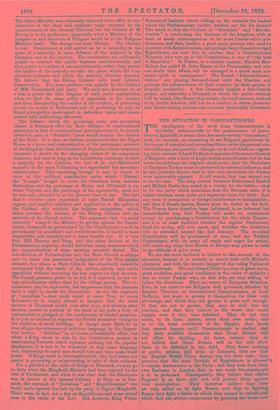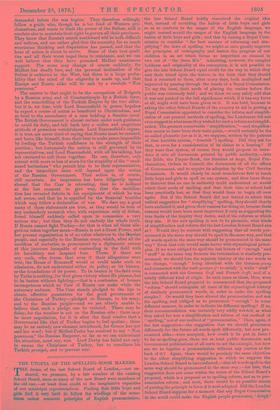classes in Denmark offer for their defiance of constitutional T HE
intelligence of the week from Constantinople is be principles is, that if constitutional principles were to strictly 1 decidedly unfavourable to the maintenance of peace. observed, men of " Socialist " ideas would become the leaders General Ignatieff, it seems clear, has made several "concessions," of the State. It is also, we believe, maintained that the Upper such, for example, as consenting to see Bulgaria garrisoned by House is a more real representative of the permanent interests the troops of aneutral and powerless State, under the general con- of the kingdom than the Chamber of Deputies, whose transitory trol of Europe, and possibly—though we do not think so—agree- character is shown by the changing nature of its component ing to be content if Lord Dufferin is appointed Governor-General majority in the mere Volksthing is a regrettable but secondary of European Turkey must be protected by external influence, and consideration. This reasoning, though it may be found in he has probably known that to this very protection the Pashas some of the political manifestoes under which " Disraeli were immovably opposed. At all events, that has turned out the Younger" sought to cover his transition from extreme to be the case. The long contest between Mahommed Rushdi Radicalism and the patronage of Hume and O'Connell to ex- and Midhat Pasha has ended in a victory for the latter,—that treme Toryism and the patronage of the squirearchy, need not is, for the party which maintains that the Ottoman caste, if it be seriously attended to at the present time of day. The fact Makes reforms, must make and supervise them for itself ; that that it receives open expression in some Danish Ministerial any form of occupation or foreign interference is inadmissible ; organs, and implicit adhesion and application in the policy of and that if Russia insists, Russia must be defied in the field. the Cabinet, only exhibits the helpless antagonism which The Powers have therefore been informed, in an informal but exists between the conduct of the Estrup Cabinet and the unmistakable way, that Turkey will make no concessions interests of the Danish nation. The argument that " a social except by proclaiming a Constitution for the whole Empire ; necessity" compels the Ministry to govern against the Consti- and it is at least doubtful whether the regular Conference, tution, inasmuch as government by the Constitution would be fixed for to-day, will ever meet, and whether the Armistice government by anarchists and revolutionaries, is hardly a more will be extended beyond the 2nd January. The so-called respectable, and certainly not a more tenable one. It is true Constitution will be proclaimed at once, and the Turkish that MM. Hansen and Berg, and the other leaders of the Government, with its army all ready and eager for action, Parliamentary majority, would introduce many measures which will await any steps that Russia or Europe may please to take the representatives of some existing interests detest. The in an attitude of quiet scorn.
introduction of Voluntaryism into the State Church is always We are the more inclined to believe in this account of the sure to rouse the passionate indignation of the Tory-parson situation, because it is entirely in accord both with Midhat's element, but where a State Church has admittedly ceased to character and with the known temper of the ruling Pashas at correspond with the wants of the nation, reform may excite Constantinople. The new Grand Vizier is a man of great nerve, opposition without becoming the less urgent on that account. great ambition, and great confidence in the value of audacity ; The Danish peasants prefer to be led, it is reported, by the vil- and he sways Pashas who, on this side, are very willing to lage schoolmaster rather than by the village parson. The cir- follow his directions. They are weary of European dictation. cumstance may be deplorable, but we presume that the peasants They do not want to see Bulgaria well governed, whether by have a right to choose for themselves. As for the reproach Russian Viceroys, or International Commissioners, or Lord of " socialism "—that ready taunt of every Tory to every Dufferin, but want to govern it themselves for their own Reformer—it is simply absurd to imagine that the rural advantage, and think they can govern it quite well enough. electors of Denmark would, year after year, and election after If they are not to govern, they may as well lose the election, persist in putting at the head of the polls a body of province, and that they believe is, the worst that could representatives pledged to the confiscation of landed property. happen even if they were defeated. They do not care It is just as rational to suppose the French peasantry voting for much, to do them justice, about their own necks ; and the abolition of small holdings. A charge more likely to be as to the total overthrow of the Empire, they know trae alleges the utterance of seditious language by the Opposi- that cannot happen until Constantinople is shelled, and tion leaders. " Sedition" is, of course, a formidable affair, but they have satisfied themselves that Great Britain will when a King sworn to rule by the Constitution, persists in not allow the shelling. At heart, indeed, they do maintaining Cabinets which represent nothing but the popular not believe that Great Britain will in the end allow displeasure, it is not to be wondered at that some language them to be defeated in the field. They know nothing very displeasing to royal ears should now and then make itself of public opinion and little of Cabinets, they see that heard. If Kings want to be complimented, they had better not the English Grand Vizier desires war for their sake ; they persist in governing or misgoverning in spite of their subjects. perceive that the most Turkish of Englishmen is allowed-1 For a parallel to the state of things in Denmark, we may go to remain Ambassador to the Porte ; and they hear from their to Italy when the Minghetti Ministry had been rejected by the own Embassy in London that in any event Constantinople vote of Parliament, and when it was clear that the Electorate is to be protected. Consequently, they believe that official was in favour of the present Cabinet. In Italy, as in Den- England is on their side, and will protect them against demanded before the war begins. They therefore willingly follow a guide who, though he is too fond of Western pro- clamations, and wants to limit the power of the Sultan, still is resolute also to maintain their right to govern all their provinces. They know that Russia's march southward will be both difficult and tedious, and are rather glad that the necessity for so much wearisome thinking and disputation has passed, and that the hour of action is about to arrive. Some of their best quali- ties and all their worst impel them to resistance, and we can well believe that they have promised Midhat unanimous support. The scene may change of course suddenly, for Midhat has deadly foes, and the personal inclination of the Sultan is unknown to the West, but there is a large proba- bility that the mind of the oligarchy is made up, and that Europe and Russia alike will be met by a resolute " Non possumus." The answer to that ought to be the occupation of Bulgaria by a Russian army and of Constantinople by a British force, and the remodelling of the Turkish Empire by the two allies; but it is, we fear, with Lord Beaconsfield in power, hopeless to expect a course of action so beneficial to Christendom, and so fatal to the ascendancy of a race holding a Semitic creed. The British Government is almost certain under such guidance to avoid its duty, and fall back into a sullen and suspicious attitude of powerless watchfulness. Lord Beaconsfield's organs, it is true, are never tired of saying that Russia must be resisted, and have, like himself, done their best to make peace impossible by feeding the Turkish confidence in the strength of their position ; but fortunately the nation is still governed by its representatives; and Lord Beaconsfield, with all his talking, has not ventured to call them together. He can, therefore, only retreat with more or less of scorn for the stupidity of the " snub- nosed barbarians" who permit him to be their representative, and the immediate issue will depend upon the action of the Russian Government. That action is, of course, still uncertain. An impression has been diligently spread abroad that the Czar is retreating, that he is inclined at the last moment to give way, that the mobilisa- tion has revealed defects in his equipments of which he was not aware, and that he is appalled by the financial troubles which may follow a declaration of war. We dare say a good many of those statements are true, as they would be true of any melancholy monarch who, with experience only of defeat, found himself suddenly called upon to commence a very serious war ; but then they do not embody the whole truth. If Russia cannot fight Turkey—for that is what all these alle- gations taken together mean—Russia is not a Great Power, and her present organisation is of no value whatever to the Bussian people, and especially to the Russian army, which, after all the sacrifices of centuries, is pronounced by a diplomatic retreat at this juncture incapable of contending in the field with its hereditary and despised foes. Those, if there are any such, who dream that even if their allegations were true, the House of Romanoff would or could make such an admission, do not understand either its policy, or its history, or the foundations of its power. To be beaten in the field even by Turks is nothing, for God gives victory where He pleases, but to be beaten without fighting,—that is a confession of human incompetence which no Czar of Russia can make while the autocracy endures. The Czar stands pledged to the lips to obtain effective guarantees for the good government of the Christians of Turkey—pledged to Europe, to his army, and to the Russian people—and we are utterly unable to believe that each a pledge can be violated. There may be delay, for the weather is not on the Russian side ; there may be more negotiation, for it is after the final resolve that a Government like that of Turkey begins to feel qualms ; there may be an entirely new element introduced, for Greece has not said her word; but if Midhat Pasha has resolved to say " Non possumus," the Russian Emperor; so far as we can understand the situation, must say, war. Lord Derby has failed not only to rescue the Christians of Turkey, but to conciliate his Turkish protege's, and to prevent war.



































 Previous page
Previous page